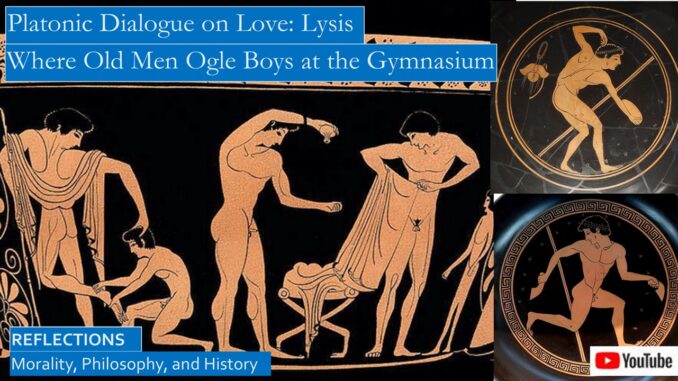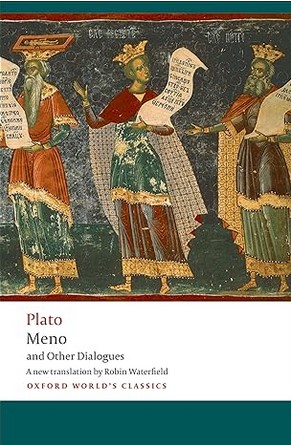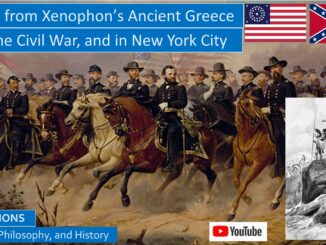
How can we benefit by reflecting on Lysis, the Platonic dialogue on love and friendship? Or is Socrates reflecting on relationships between acquaintances?
Can only two good men be friends? Can two bad men be friends, and can a good and a bad man be friends?
If you friend does not reciprocate your friendship, is he still your friend?
Can an enemy love a friend, and can a friend love an enemy?
Are friendships strengthened by what they hold in common, or by their differences?
YouTube Script other with Book Links:
https://www.slideshare.net/BruceStrom1/lysis-platonic-dialogue-on-love-and-friendship-where-old-men-ogle-boys-at-the-gymnasium
Lysis YouTube video: https://youtu.be/HrSZ5SPUZ7Y
THREE PLATONIC DIALOGUES ON LOVE
There are three Platonic dialogues on love and friendship, according to many scholars. The early dialogue on love and friendship is Lysis, and also the two later dialogues that contrast romantic or carnal love to divine love, the Symposium, where the dinner guests, then Socrates, compose speeches on love,
Xenophon and Plato, Socratic Dialogue, Symposium, Romantic and Carnal Love, Part 1
https://seekingvirtueandwisdom.com/xenophon-and-plato-socratic-dialogue-symposium-romantic-and-carnal-love-part-1/
https://youtu.be/OIe5pn2S1Ls
Xenophon and Plato, Socratic Dialogue, Symposium, Divine and Noble Love, Part 2
https://seekingvirtueandwisdom.com/xenophon-and-plato-socratic-dialogue-symposium-divine-and-noble-love-part-2/
https://youtu.be/z6X3pwVTdrc
and the Phaedrus, with the famous metaphor of the heavenly chariot pulled by the immortal, divine steed, who wishes to steer upward, and the mortal, carnal steed, who pulls the chariot back down to earth. These steeds represent the competition between the base and divine loves in each of our souls.
Plato’s Dialogue of Phaedrus on Carnal Love and Rhetoric, Part 1
https://seekingvirtueandwisdom.com/platos-dialogue-of-phaedrus-on-carnal-love-and-rhetoric-part-1/
https://youtu.be/JFw5ThfwUAg
Plato’s Dialogue of Phaedrus on Divine Love and the Heavenly Chariot, Part 2
https://seekingvirtueandwisdom.com/platos-dialogue-of-phaedrus-on-divine-love-and-the-heavenly-chariot-part-2/
https://youtu.be/BOtavup_N4g
We also include the dialogue on Alcibiades 1 as a dialogue that explores the friendship between Alcibiades and Socrates.
We will also cut a video summarizing these four dialogues on love and friendship, examining the question of whether Socrates condones homosexuality and pederasty, or men-boy love.
SUMMARY OF THE PLATONIC DIALOGUE, LYSIS
The Socratic dialogue of Lysis is even more disturbing for those who are less tolerant of homosexuality. In this dialogue, Socrates is accompanying the older men Hippothales and Ctesippus to the gymnasium, where the twelve-year-old Lysis will be exercising with his young best friend, Menexenus. Hippothales has a crush on the young Lysis, and Ctesippus complains that his older friend even composes love songs about the young Lysis. Socrates agrees to try to provide an entrée for Hippothales to converse with Lysis, to get to know him better.
Everyone matured quicker out of necessity in the ancient world, as people did not live as long as they do today. For example, Alexander the Great first commanded an army as regent when he was sixteen,[1] so sixteen-year-olds had far more responsibilities in the ancient world than they do today, often they passed away before they were forty years old. However, boys at twelve in the ancient world were still twelve years old.
Lysis shows no interest in Hippothales, but everyone knows he is always drawn to a debate. Socrates starts a discussion with Ctesippus, enticing Lysis to join in the debate. Socrates then engages Lysis in an exploration of the nature of friendship. Since Lysis is quite young, Socrates does not seek to prove him a fool. Instead, Socrates proposes philosophical queries about love and friendship, which they both discuss. After all, philosophy is the love of wisdom, and philosophy should be our first love, according to Socrates.
Before they discuss friendship, Socrates opens with a series of what appear to be grooming questions, asking whether his parents truly love him since they restrict what he can do. Lysis responds that his parents, indeed, are quite protective, since he is not yet of age, and accepts that, in some respects, his slaves can do some things, like lead the horse in their cart, that he cannot do.
Socrates notices that Hippothales is quite shy, so he decides not to encourage Lysis to converse with his suitor.[2] This reluctance can be due to the fact that although old men liked to observe gymnastic exercises and competitions to ogle the nude young boys, that pederasty at the gymnasium was likely illegal in Athens. One footnote references an ancient court case referencing these laws guarding against pederasty at the gymnasium, which applied to both spectators and especially coaches.[3]
As in the Phaedrus, Socrates’ dialogue on friendship in Lysis extols an ideal form of friendship based on philosophy rather than passion. The dialogue ends with Lysis noting that it is late, and that his parents will are expecting him to return home soon. But the dialogue does shed additional light on the fact that in the trial and execution of Socrates, one of the charges against him accused Socrates is that he was corrupting the youth of Athens.
Pondering the Death of Socrates in Xenophon, Plato, and Aristophanes
http://www.seekingvirtueandwisdom.com/pondering-the-death-of-socrates-in-xenophon-plato-and-aristophanes/
https://youtu.be/Mip1vgRKH1E
LYSIS: NATURE OF FRIENDSHIP AND ACQUAINTANCES
Plato notes that “Lysis was by far the best-looking of the boys and young men and looked as though he deserved to be called not just beautiful, but a model of the noble combination of beauty and excellence.” (207a)
The opening Socratic questions lead me to wonder if Socrates is pondering the nature of acquaintanceship rather than friendship. The most common type of acquaintances are our work friends; rarely do these friendships continue after we change jobs. These often include other business acquaintances, though most of us keep up with them more readily.
SOCRATES: “Will we be anyone’s friends, will anyone love us, in those areas where we are useless?”
LYSIS: “Of course not.”
SOCRATES: “So, if your father doesn’t love you at the moment, that is because no one loves anyone else in so far as he is useless.”
I see this as a grooming question, as Socrates has pointed out that his father does not trust Lysis to be independent, going where he wants to go.
LYSIS: “So it seems.”
SOCRATES: “It follows that everyone will love you and be on familiar terms with you if you become knowledgeable, because you’ll be helpful and beneficial. But if you don’t, no one will love you, not your father, nor your mother, nor your relatives, nor anyone else.” (210c-d)
Plato appears to be advancing a utilitarian type of love. Although we all seek friendship with those who will contribute to our friendship, yet once we befriend someone, we should not keep score, but help our friends however we can. But his comment that his parents would not love him if he is not useful seems odd, Dr Wikipedia suggests that Plato means that children please their parents when they excel at a task.
SOCRATES admits that “I am deeply passionate about acquiring friends. I would prefer a friend to a good horse or a dog.” But my advice is: Do not admit this preference to your friends. Socrates asks, “When is a person fond of another person, who is his friend? Is the one who loves the friend of the one who is loved, or is it the other way around?” (211e, 212a-b)
SOCRATES asks a similar question, “Is the one who loves the friend of the one who is loved, whether his love is not returned or when he even meets with hatred? Or is the one who has loved the friend of the one who loves? Or, in this situation, is neither of them the friend of the other, unless they both love each other?” (211e-212a)
SOCRATES then wonders, “Previously, we thought that if just one of them loved the other, they were both friends. But now we are saying that, unless both of them love each other, neither of them is a friend to the other.” (212c) Perhaps here Socrates is repeating the adage that marriage is the one task in life that you cannot work on by yourself. Is friendship then like marriage?
One simple answer is that in the long run both people need to be friends to each other, but we will all face a crisis in our life when we need our friends to be there for us, though we can contribute little to the friendship at the moment.
Perhaps a superior path for our friendship to take is that of St John the Cross. In his Dark Night of the Soul, he teaches us that we should only seek those close friends whose friendship will increase in us our Love of God, or the Platonic Love of the Good. In this divine friendship, since those who truly Love God also love their neighbor as themselves, and this goes double for our friends, then there is no discussion of who loves whom, either ever or at this moment, for the love of true friends is assumed.
St John of the Cross, Dark Night of the Soul, Seven Capital Sins and Best Type of Close Friend
https://seekingvirtueandwisdom.com/st-john-of-the-cross-dark-night-of-the-soul-seven-capital-sins-and-best-type-of-close-friend/
https://youtu.be/DgL7Y5pIFAU
St Augustine teaches a similar lesson in his Confessions, that we should love all our close friends in God, and not seek from our friends that which we should seek only from God.
St Augustine’s Confessions: Manichaeism, NeoPlatonic Philosophy, and Monica’s Prayers, Books 3, 4, and 5
https://seekingvirtueandwisdom.com/st-augustines-confessions-manichaeism-neoplatonic-philosophy-and-monicas-prayers/
https://youtu.be/ydskqlgZSrE
Socrates admits the case where a child momentarily despises his parents when they discipline him, but since this discipline is an expression of their love for their child, the child is still dear to them. (213a)
SOCRATES asks whether “only good men can be friends with one another? Can true friendship exist between a bad man and either a good man or another bad man?” (214d) The response of St John of the Cross would likely be that friendship with a bad man will draw you further away from the Love of God, poisoning your soul, leading you away from salvation. Friendship with a good man leads you to love and compassion, friendship with a bad men leads you to hatred and cruelty.
SOCRATES asks whether you should have much in common with your friends. He observes that Hesiod “points out that poor people have no choice but to be friends with rich men, that weak people are forced to be friends with strong people, whose support they rely on, that sick people are bound to be close to their doctors, and that laymen must inevitably value and love experts.” Socrates points out that though many friendships form because of what they hold in common, that sometimes friendships can be strengthened when there are differences. (215d-e)
Once a boss of mine asked me if I thought he was a good boss. I responded, “Chuck, it is not your job to get along with me, it is my job to get along with you.” This questioning by Socrates suggests that this dialogue is more about acquaintanceship than friendship.
Hesiod: Works and Days, Early Greek Moral Philosophy
https://seekingvirtueandwisdom.com/hesiod-works-and-days-early-greek-moral-philosophy/
https://youtu.be/HH9t2eTh8RE
SOCRATES asks, Can “an enemy love a friend, and can a friend love an enemy?” The Christian answer is when Jesus exhorts us to love our enemies. But Jesus does not exhort us to be friends with our enemies, you can only be friends with someone you trust, and someone who, in the long run, returns your love. You are allowed to choose your friends, just as you must only choose one to be your spouse.
Socrates is sloppy with his definitions; he never really defines what is good and what is bad. He does admit that there are those who are only partially bad: “When, despite the presence of badness, it is not yet really bad, the presence of badness makes it desire goodness; but when the presence of badness makes it really bad, it loses both the desire for and the friendship of the good.” “When someone is neither bad nor good, but actually bad, then it is impossible for the bad to be friend to the good.”
While motives matter, only God can see into our heart, and we often deceive our neighbors and often ourselves above our evil motives. We should seek always to see the best in our neighbors and friends; when we do that, we will bring out the best in our neighbors and friends. It is better to think the best about our neighbor and be mistaken, than to this the worst of our friend and be mistaken.
Near the end of the dialogue, Socrates leads the discussion to romantic or carnal love.
SOCRATES: “Whenever one person desires or lusts after another person, boys, he wouldn’t feel desire or lust or affection unless he were in some respect close to his beloved, thanks to his soul or to some cast of his mind or to his personality or to his appearance.”
MENEXENUS: “Quite so,” but Lysis kept quiet.
SOCRATES: “What we have found is that we are bound to love that to which we are naturally close.”
MENEXENUS: “So it seems.”
SOCRATES: “It follows, then, that a genuine lover, one who is not pretending, is bound to be loved by the boy he fancies.” This sounds like grooming to me.
This makes the boys uncomfortable, “Lysis and Menexenus could hardly bring themselves to nod their assent to this, but Hippothales’ pleasure showed in the variety of colors he turned.” (222a-b)
This is the only section of the dialogue where Socrates discusses the romantic or carnal aspect of earthly love. Socrates instead seeks philosophy, and in Greek this word means: love of wisdom. Philosophy is the divine love that Socrates primarily seeks. Socrates is married and no doubt loves his wife and loves his students, seeking to teach them an ascetic philosophy. This makes sense, the Socrates of Xenophon is more stoic than the Socrates of Plato.
The Stoic Socrates of Xenophon
http://www.seekingvirtueandwisdom.com/the-stoic-socrates-of-xenophon/
https://youtu.be/LWfoHhtNY8I
Socrates concludes that friendship is indeed a puzzle.[4] Perhaps friendship is not so much an academic endeavor we need to understand, but is rather companionship should enjoy and experience. As true friends we should seek to bring out the best in everyone we meet, making everyone we meet slightly better people because they met us.
DISCUSSING THE SOURCES
The translation of these early Platonic dialogues by Robin Waterfield was excellent, though somewhat wordy in places. As with many Platonic dialogues, they can be difficult to follow, I must admit I consulted the section summaries in the Wikipedia article on Lysis as I read Plato’s reflections on friendship.[5] The footnotes for this translation are excellent, IMHO you cannot really understand the Platonic dialogues without them. However, I could not parse the meaning out of some of the key sentences, and learning Greek may not help.
The footnotes explain that this phrase puzzles most serious students of Plato:
“Can we reach that which is a primary lovable object, the final end which makes everything else that is lovable, lovable?” (219b) Maybe this refers to excellence, or knowledge, or happiness, maybe it is unattainable, who knows?
Although Professor Sugrue’s lectures on the Platonic dialogues does not include a reflection on Lysis, he does have excellent lectures on the Symposium and the Phaedrus.[6]
Personally, I prefer Xenophon’s and Plato’s dialogues on the Symposium, although the image of the charioteer driven by two contending steeds, one steed immortal, seeking to rise you up to divine love; the other steed mortal, seeking to drag you down to earthly passions with carnal, romantic love, is as memorable as it is vivid. Plato’s Lysis, an early dialogue on love and friendship, is a distant third.
There are many free public domain sites with the text of Lysis, although this version has neither paragraph numbers nor footnotes:
http://classics.mit.edu/Plato/lysis.html
We also have a video on book reviews on Greek History and Philosophy.
Book and Lecture Reviews of Ancient Greek History and Philosophy
http://www.seekingvirtueandwisdom.com/book-and-lecture-reviews-of-ancient-greek-history-and-philosophy/
https://youtu.be/472aVKkPsk8
[1] https://en.wikipedia.org/wiki/Alexander_the_Great
[2] https://en.wikipedia.org/wiki/Lysis_(dialogue)
[3] Plato, Meno and Other Dialogues, Lysis, p. 163, referencing Footnote to Lysis 206d: Aeschines, Against Timarcus, http://www.perseus.tufts.edu/hopper/text?doc=Perseus%3Atext%3A1999.01.0002%3Aspeech%3D1
[4] Plato, Meno and Other Dialogues, Lysis, translated by Robin Waterfield (New York: Oxford University Press, 2005, originally 300’s BC), pp. 67-96 and https://en.wikipedia.org/wiki/Lysis_(dialogue)
[5] https://en.wikipedia.org/wiki/Lysis_(dialogue)
[6] https://www.thegreatcourses.com/courses/plato-socrates-and-the-dialogues and https://amzn.to/3t3Cu8w





3 Trackbacks / Pingbacks